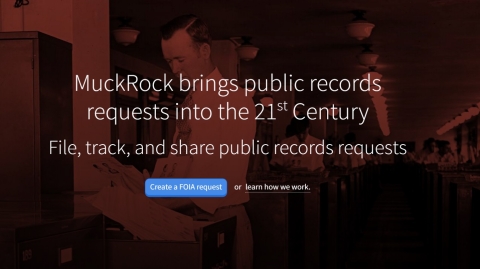
In an effort to counter this trend, award-winning reporter Michael Morisy co-founded MuckRock, an online portal that brings together journalists, activists, researchers and concerned citizens to solicit, scrutinize and share U.S. government documents with the goal of increasing transparency and informing democracies.
Below, he discusses the many ways MuckRock aims to offer journalists and other concerned parties a way to create, share and fund public interest reporting.
Q: You are an award-winning reporter with experience submitting FOIA requests. How well do you think the current FOIA system functions?
I think there are two major challenges to FOIA in the U.S., both of which generally seem to be moving in the wrong direction.
The first is that the process is incredibly slow and bureaucratic. As technology has driven the pace of almost every other process to be much quicker, FOIA is slowing down: Regular requesters now expect to wait months or even years for a response. At the same time, filing a FOIA increasingly feels like filing your taxes: Agencies are devising complex forms and websites, giving arcane rejections, and generally making requesters feel like they have to have a law degree to exercise what should be treated as a fundamental right.
Agencies should instead be embracing simple, well-understood technologies (mostly email and the telephone) to make the process easy and inviting, while embracing modern data indexing and storage for their own offices to make searches easier and more comprehensive, to help not just make FOIA better, but their entire internal operations work more smoothly.
The second is the broad use of national security exemptions and reasoning to gut transparency laws. We've seen local police departments cite national security to reject a request for parking ticket data, while lack of scrutiny has allowed national security contractor spending to balloon to truly staggering levels where, in many cases, we're literally paying for either nothing or actually spending money in ways that undermines our security.
And again and again, things seem to be poised to get worse, such as the broad new exemptions that were written into CISA [the Cybersecurity Information Sharing Act], when time and again great reporters like James Risen show that to truly protect America, we need much more scrutiny and transparency on these issues.
Q: MuckRock bills itself as a tool that “brings public records requests into the 21st Century.” Can you give an overview of how exactly it does that?
MuckRock makes it easy to file and track public records requests with two taps with an automated request system that works in all 50 states and with every federal agency. Users can also browse 17,000 requests and over 650,000 pages of previously released documents on everything from NSA contracts to disaster response.
We also make it easy for small publications and independent reporters to manage and crowdfund investigations they care about, whether it's just raising a few hundred dollars for a request fee or raising thousands for a big, complex series of stories.
Q: What prompted you to co-found MuckRock with your partner Mitchell Kotler?
We believe that technology can play a huge role in improving and scaling accountability reporting, particularly at the local level. Our first focus was on making it easier for reporters to ask for and get government records, and we offer tools like the ability to file one request, for example, with hundreds of police departments across America with just a couple clicks. That's something a single reporter or even a mid-sized newsroom just could never do in the past.
Now we're making it easier for our users to fund that kind of public-interest reporting, and we're continuing to develop ways that put technology to work for better, more transparent, more collaborative investigative and public interest journalism.
Q: Why do you feel it is important that a system like MuckRock exists for reporters today?
Reporters and newsrooms are cutting back on using public records requests at all levels, and just like a muscle when it's not used the public records process gets weaker. Since we make public records requests not just easier but more useful, we hope to strengthen this vital institution and to open the process up to both more reporters and to the public at large.
Q: What is the worst-case scenario for a reporter who submits a FOIA request, i.e., how long might it take for arequest to be processed, what hoops might he or she have to jump through?
We've had requests take five years to complete, and have had colleagues who have fought for the release for over a decade in some cases. Worst case, I think there's one request that, admittedly complex, is close to 20 years old. Lawsuits, appeals, tedious negotiation are all common.
Q: Through FOIA requests, MuckRock and the reporters who use it have surfaced everything from FBI files and NSA contracts to documents that detail ways in which private prisons have used the legal system to their advantage. What MuckRock user projects are you most proud of?
So, so many. Our look into military gear flowing to local police departments was inspired by a user's request, and ultimately became such a huge story. Same with Stingrays, and much of our work on drones being used domestically in the United States: All those projects came about as a result of incredibly hard staff work combined with allowing our users to be active participants in our reporting process.
Q: Do you know of any tools similar to Muckrock in other countries that you could recommend to ICFJ’s readers and participants around the world?
We've worked closely with Alaveteli for years, and it's such an amazing community with similar sites in 20 countries now. We're also always interested in finding new partners, either in the U.S. or internationally.
Main image is a screenshot of MuckRock.